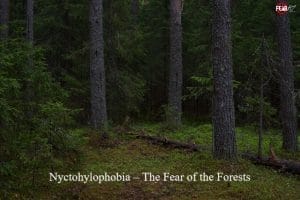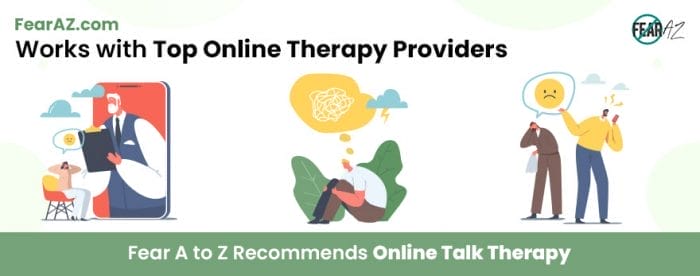Share This Article
Deep Into the Fear of Dark Forests
Does the thought of being stuck in the woods at night make you break a sweat and panic?
Would you choose to stay home rather than experience a great camping adventure with friends, because the idea of a dark forest makes you ill?
If yes, you might have nyctohylophobia.
Forests can be magical places, though intimidating at night. Whose to know what lies within, right? And our minds tend to wander into the unknown: the mystery, the monsters, and the who-knows-what types of creatures that may shelter in those woods. Emotions such as fear and awe for something we don’t quite understand are completely natural. But what you feel is so much more.
Maybe you can’t explain the terror that grips you when people talk about forests. The mere thought of being alone in the woods is enough to spiral your imagination into overdrive. You can’t stop thinking about the dangers and the unknown element. You end up excusing yourself from state forest picnics, beg off the overnight hiking adventure, or make up plans to avoid walking through the woods.
Being scared of the woods is natural but having an extreme fear of woods phobia is an entirely different matter. But you can overcome this fear. Many proven methods can slowly ease your panic until you feel as though you can control it.

What Causes a Fear of the Forest?
Your fear of dark, wooded areas or forests at night stemmed from something.
For one, forests are murky, mysterious, and, yes, generally scary. This makes them a perfect setting for horror films where people tend to get lost. Eventually, something unknown chases them. Remember the Blair Witch Project?
Forests have become synonymous with a survival scenario where being there overnight can turn into a life or death situation.
Considering dark forests have become a gory venue for death, murder, and elemental plots, moviemakers have began capitalizing on the natural mystery of woods. Take Sleepy Hollow for instance. The scarier the movie, the greater your aversion to the woods.
Or perhaps your fear of the forest may have grown out of fairytales such as “Hansel and Gretel.” Maybe it was “Little Red Riding Hood.” Since childhood, stories have portrayed dark forests as being steeped with unknown and inexplicable dangers. Who could fault you for fearing the woods?
Everything You Need to Know about Nyctohylophobia
Not wanting to go into the forest, especially at night, is understandable. But being completely afraid of the woods is an entirely different story. This level of fear is beyond normal and should be taken seriously.
Nyctohylophobia, meaning fear of dark, wooded places or fear of the forest at night, comes from the Greek word nycto, meaning “night,” and hylo, which stands for “forests.”
This fear is closely related to hylophobia, or the fear of forests regardless of the time of day. Other phobias, including nyctophobia (fear of the dark), thanatophobia (fear of death), and autophobia (fear of being alone), can trigger nyctohylophobia.
Surprisingly, you are not alone. A lot of people have nyctohylophobia. Based on a survey, 18 percent of those who answered admitted to being afraid of dark, unknown wooded areas, while 41 percent would rather be anywhere than in the forest alone. Research also shows that the phobia is more common in women.
While this fear is not something you have to deal with every day, the idea or sight of a dark forest, probably in a movie or on television, can make you anxious and may even trigger a panic attack.
Symptoms of Nyctohylophobia
Now that you know most nyctohylophobia facts, learning about the symptoms is the next step.
Below are the physical and psychological symptoms that you might experience if you have nyctohylophobia. You might show only one or two of these symptoms. But there is also a possibility that you experience many of them.
Physical Symptoms
- Hyperventilation, heart palpitations, and shallow, rapid breathing
- Dry mouth
- Sweaty hands
- Excessive sweating
- Higher blood pressure
- Nausea
- Headache and dizziness
- Gastrointestinal distress
Psychological Symptoms
- Anxiety level goes up
- Panic attacks
- The desire to run, hide, and even scream or cry
- Avoid watching movies that show wooded areas and forests
- Avoid activities like hiking, picnics, trekking, and overnights in cabins in the forest
- Constant dread about getting lost and being alone in the woods
- Uncontrollable thoughts of being attacked in the woods
How Do You Deal with Nyctohylophobia?
When your fear surfaces, you know that you can’t control your reaction. By the end of your episode, you end up feeling embarrassed and physically and emotionally tired. If your fear of the forest is affecting your quality of life, and social relationships are at risk, then getting help is the next step for you.
Although there is no specific methodology to cure the phobia, there are many treatment options that you can explore and try.
Self Help: Helping Yourself Overcome Your Fear
If you feel a little nervous about discussing your fears with a stranger, try self-help methods first. After all, any phobia is an inner battle. You have a good idea of what triggers it, how it affects you, and how it makes you feel afterward.
You can start with general self-help techniques to help you control and eventually ease your fear. You can start learning and practicing deep breathing methods and doing some meditation to direct your mind to calm down and relax. Surround yourself with positivity and tranquility when you are starting to feel anxious. If you’re open to it, you can even try yoga.
The next self-help recommendation may be a little harder, but creating a positive visualization of a forest can help you. Re-frame your mental and visual representation of forests. Look into it as a place of serenity where you can enjoy the richness of the Earth naturally. Look at pictures of forests, the pleasant ones, where the trees are basking in the golden sunshine against a backdrop of clear skies.
Seeking Professional Help
As reinforcement to the self-help techniques you’ve adapted, speaking with a professional therapist can also make a lot of difference. Here are some treatments that your therapist might propose to you.
Exposure Therapy
This is a common treatment for people suffering from phobias. The principle of this therapy is “the more you are exposed to the object of your fear, the less you’ll be scared of it.” With this kind of treatment, expect your therapist to display pictures of forests and dark, wooded areas. Eventually, you progress to watching short videos of it. This is a long process, but it is proven to desensitize your fear until one day, you can stand in a forest, calm and composed, ready for sundown.
Hypnotherapy
In severe cases, knowing the root of your fear can provide answers and the correct treatment approach. This form of treatment has helped adults attain positive results.
Medication
This is your last line of defense if all else fails. The medications being prescribed to you are not intended to cure the phobia itself but rather tame the anxiety and tension you feel. However, consider it the last option as taking medication can cause side effects.
Other treatments that can be suggested by your therapist to help you overcome nyctohylophobia are Cognitive Behavior Therapy (CBT), Dialectical Behavior Therapy (DBT), Mindfulness-Based Stress Reduction, and Neuro-Linguistic Programming.
Learning to Cope with Nyctohylophobia
All the recommended techniques and methodologies may not cure you of your fear of the forest, but they can help you stay in better control when the panic starts. You can improve the way you manage your anxiety and not allow it to control you.
Again, it is worth emphasizing that it is natural to be afraid of dark forests at night. But having that illogical fear of the forest can harm you. That’s why you have to find the courage to deal with it.
Reducing your apprehension can be easier if you have a strong support system. Family and friends that understand your fear will be more than happy to encourage you.
Learning to control your fear is already a huge step in overcoming your phobia. You have to continuously challenge yourself until the fear reduces to the level of very slight discomfort.
Conclusion
Learning how to manage your fear of the forest can make vacations and road trip adventures more enjoyable. You can even start a vlog or documentary series of your nights in the forest as you challenge your fears.




